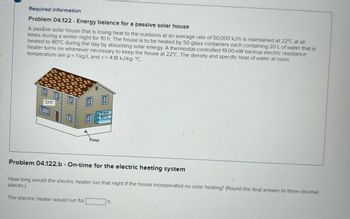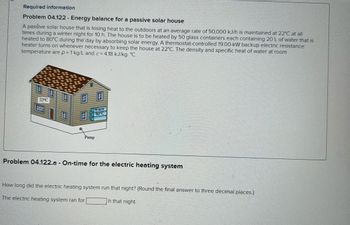
Principles of Heat Transfer (Activate Learning with these NEW titles from Engineering!)
8th Edition
ISBN: 9781305387102
Author: Kreith, Frank; Manglik, Raj M.
Publisher: Cengage Learning
expand_more
expand_more
format_list_bulleted
Question

Transcribed Image Text:Required information
Problem 04.122 - Energy balance for a passive solar house
A passive solar house that is losing heat to the outdoors at an average rate of 50,000 kJ/h is maintained at 22°C at all
times during a winter night for 10 h. The house is to be heated by 50 glass containers each containing 20 L of water that is
heated to 80°C during the day by absorbing solar energy. A thermostat-controlled 19.00-kW backup electric resistance
heater turns on whenever necessary to keep the house at 22°C. The density and specific heat of water at room
temperature are p= 1 kg/L and c=4.18 kJ/kg. °C.
22°C
Water
80°C
Pump
Problem 04.122.b - On-time for the electric heating system
How long would the electric heater run that night if the house incorporated no solar heating? (Round the final answer to three decimal
places.)
The electric heater would run for
h.

Transcribed Image Text:Required information
Problem 04.122 - Energy balance for a passive solar house
A passive solar house that is losing heat to the outdoors at an average rate of 50,000 kJ/h is maintained at 22°C at all
times during a winter night for 10 h. The house is to be heated by 50 glass containers each containing 20 L of water that is
heated to 80°C during the day by absorbing solar energy. A thermostat-controlled 19.00-kW backup electric resistance
heater turns on whenever necessary to keep the house at 22°C. The density and specific heat of water at room
temperature are p = 1 kg/L and c = 4.18 kJ/kg- °C.
22°C
Water
80°C
Pump
Problem 04.122.a - On-time for the electric heating system
How long did the electric heating system run that night? (Round the final answer to three decimal places.)
The electric heating system ran for
h that night.
Expert Solution
This question has been solved!
Explore an expertly crafted, step-by-step solution for a thorough understanding of key concepts.
Step by stepSolved in 2 steps with 2 images

Knowledge Booster
Similar questions
- 1. .Mexico's metro requires the implementation of an air conditioning system for each of its cars. On the hottest days the air inside the car can reach 45°C. A temperature of 25°C is expected to be achieved to keep passengers satisfied. A car measures 17 m x 2.5 x 2. In order to make the decision on the air conditioning system to install, the engineering director has asked to calculate: A. Amount of energy to be removed from the car when the air is at 45°C and the car is empty. B. Amount of energy to withdraw when the car is full (approx. 130 people with a volume of 0.06 m3/person). Each person releases 30 kJ while in the car. C. Power of a system that removes the estimated energy A and B in less than 1 minute.arrow_forwardPrepare a report on the heating systems available in your area for residential buildings. Discuss the advantages and disadvantages of each system and compare their initial and operating costs.arrow_forwardPls. Answer thank you! A logging firm in Isabella operates a Diesel Electric Plant to supply its electric energy requirements. During a 2 hour period, the plant consumed 250 gallons of fuel at 80°F and produced 2900 kW-hrs. Industrial fuel is used at 30°API and was purchased at P30/li at 60°F. Determine the overall thermal efficiency in percent of the plant.arrow_forward
- 12. A classroom type room with 45students taking an exam in thermodynamics is expected to release a body heat of about 8kJ/hr per person. In order to compensate this heat dissipation, an air- conditioning unit is to be installed. If specific heat capacity and density of air is 1.0062kJ/kg-K and 1.21kg/m3, determine the volume of air flow required in examination room if the air is to be cooled down from 29°C to 20°C. a. 8.5177Li/s b. 9.1262Li/s c. 9.2022Li/s d. 9.0501Li/sarrow_forwardA heat pump is used to heat a house. When the outside air temperature is 266K and the inside is maintained at 293K, the heat loss from the house is 195 kW. a. What is the minimum electric power (kW) required to operate the heat pump? b. What is the rate of heat transfer to the heat pump? C. What is the COP for an ideal heat pump operating between these temperatures?arrow_forward26. At 100°C water has a specific latent heat of vaporization of 2260 000 J/kg. What does this mean? A. Energy needed to turn 1 kg of water into ice B. 2260 000 J energy needed to turn 1 kg of ice into water C. 2260 000 J of heat is needed to boil 1 kg of steam into ice D. 2260 000 J of heat is needed to convert 1 kg of steam into waterarrow_forward
- Water melts as temp increases because : - chemical potential of the liquid is lower than that of gas - liquid and solid form eutectic mixture -chemical potential of the liquid and solid become equalarrow_forwardPlease show steps I keep coming up with -0.0044arrow_forwardHello Sir,Good Morning.I have a question in my homework related thermodynamics lesson. The following below is my question. Please advice. Thank you. Regards,Irfan An air conditioning system is used to keep the house at 65°F when the outside temperature is 85°F. The house gets heat through the walls and windows at a rate of 810 Btu/min, and the rate of heat generation inside the house from occupants, lights, and equipment is 120 Btu/min. Determine the minimum power input required for this air conditioning system.arrow_forward
- An auditorium seating 1600 people is to be maintained at 80°F dry bulb and 65°F wet bulb temperature when outdoor air is at 91°F dry bulb and 75°F wet bulb. Solar heat load s 120,000 Btu/hr and supply air is at 60°F, determine the amount of supply air. (Use sensible heat load of 225 Btu/hr and supply air is at 60°F, determine the amount of supply air. (Use sensible heat load of 225 Btu/hr per person) a. 100,000.00 lb/hr b. 83,229.17 Ib/hr c. 73,229.17 Ib/hr d. 63,229.17 Ib/hrarrow_forwardThe Ocean Thermal Energy Conversion (OTEC) system in Hawaii utilizes the surface water and deep water as thermal energy reservoirs. Assume the ocean temperature at the surface to be 20 "C and at some depth to be 6 "C Determine the maximum possible thermal efficiency achievable by a heat engine. Express the thermal efficiency as a percentage to three significant figures. Thh = 478 % Previous Answers Correct Part B What-if Scenario What would the maximum efficiency be if the surface water temperatun increased to 25 C? | Express the thermal efficiency as a percentage to three significant figures.arrow_forward4. An ammonia refrigerating plant operates between pressure limits of 10.34 bar and 2.265 bars. The refrigerant leaves the evaporator as a vapor 0.95 dry and leaves the condenser as a saturated liquid. If the refrigerant mass flow rate is 4 kg/min, find the cooling load. 65.3 kW O 70.5 kw O 75.52 kw O 52.5 kWarrow_forward
arrow_back_ios
SEE MORE QUESTIONS
arrow_forward_ios
Recommended textbooks for you
 Principles of Heat Transfer (Activate Learning wi...Mechanical EngineeringISBN:9781305387102Author:Kreith, Frank; Manglik, Raj M.Publisher:Cengage Learning
Principles of Heat Transfer (Activate Learning wi...Mechanical EngineeringISBN:9781305387102Author:Kreith, Frank; Manglik, Raj M.Publisher:Cengage Learning Refrigeration and Air Conditioning Technology (Mi...Mechanical EngineeringISBN:9781305578296Author:John Tomczyk, Eugene Silberstein, Bill Whitman, Bill JohnsonPublisher:Cengage Learning
Refrigeration and Air Conditioning Technology (Mi...Mechanical EngineeringISBN:9781305578296Author:John Tomczyk, Eugene Silberstein, Bill Whitman, Bill JohnsonPublisher:Cengage Learning

Principles of Heat Transfer (Activate Learning wi...
Mechanical Engineering
ISBN:9781305387102
Author:Kreith, Frank; Manglik, Raj M.
Publisher:Cengage Learning

Refrigeration and Air Conditioning Technology (Mi...
Mechanical Engineering
ISBN:9781305578296
Author:John Tomczyk, Eugene Silberstein, Bill Whitman, Bill Johnson
Publisher:Cengage Learning